初一下Module8知识要点
外研版七年级英语下册Module8词汇、知识点总结

Module 8Story time I.重点单词hair [wə:k]n. 头发gold [ɡəuld]n.金色; 黄金; 金牌forest['fɒrist] n. 森林once [wʌns]adv. 一次; 一回upon [ə'pɔn, əpən]prep. 在……上; 到……上once upon a time从前decide[di'said]v. 决定go for a walk散步basket ['bɑ:skit]n. 篮子notice ['nəʊtis] v. 注意到all alone独自一人的dark [dɑ:k]adj. 黑暗的pick [pik]v. 采; 摘pick up拿起; 举起soon[su:n] adv. 立刻; 不久lost [lɒst] a dj. 迷路的around [ə'raʊnd] prep. 环绕着little ['litl] adj. 小的towards [tə'wɔ:dz] prep.往; 向; 朝……方向knock[nɔk] v. 敲door [dɔ:(r)]n. 门answer['ɑ:nsə(r)] v. 应门; 回答push[pʊʃ]v. 推enter ['entə(r)]v. 进入bowl[bəʊl] n. 碗hungry ['hʌŋgri]adj.感到饿的; 饥饿的right [rait]adj. 合适的; 恰当的finish ['finiʃ]v. 吃完; 喝完; 用尽either ['aiðə(r)]adv. 也(不) piece[pi:s]n. 部件; 碎片; 一件/个/张in pieces破碎asleep[ə'sli:p]adj. 睡着的return [ri'tɜ:n] v. 返回; 归还cry[krai] v. 哭; 喊叫at first起初; 首先point[pɔint] v. 指向; 指point at指着……shout[ʃaʊt] v. 高声说; 大声喊jump[dʒʌmp] v. 跳without[wi'ðaʊt]prep. 无; 没有part [pɑ:t] n. 部分; 地区; 地方II.重点短语1.once upon a time =long long ago 从前,很久以前,once 的短语:once or twice 一两次once a week一周两次once again=once more再一次,重新; at once 立刻马上once 一次;一倍twice两次;两倍three times三次;三倍2.decide (not ) to do sth .决定(不)做某事.3.go for a walk =take a walk 出去散步4.pick up 捡起,拾起,;拿起;代词放中间5.notice sb. do sth . notice sb. doing sth .watch sb. do sth ./wathc sb. doing sth .see sb .do sth ./ see sb .doing sth .hear sb. do sth ./hear sb. doing sth .这些感观动词,听,看,后面跟动词原形,表示动作已经发生过,或经常发生的动作;后面跟动词ing ,表示动作正在进行.6.all aione 独自一人7.knock at /knock on the door敲门8.be in pieces 碎了;破成碎片9.a piece of 一张10.return sb. sth .=rerurn sth .to sb .将某物归还给某人return=come back 返回, return =give back 归还,return to +地点返回某地11.at first 起初,首先12.point to 指向,强调方向,较远的事物.Point at 指着….指具体的东西,13.with,具有,带有, without没有,两个词语都是介词,后跟Ving/名词/.代词14.look into 向… 里面看去. Walk into走进……15.enter进入,16.look的短语:look at 看…. Look around 环顾, 向四周看look after 照顾,照看Look up 向上看,查阅look out 注意,当心, look down 向下看,看不起Look out of 朝外看look like 看起来像look for 寻找Look the same 看起来像, look forward to doing sth .盼望做某事17.be asleep 在睡觉18. I think +从句, 我认为, 否定:I don’t think ….否定前移19.go to bed ,上床睡觉, go to sleep ,入睡,睡着20.change into /change ..into ,使… 变成22.again and again 一次又一次23.get/be lost 迷路24.be asleep 入睡25.out of 从…出来;在..外jump out of…跳出……;jump into跳进……hurry out of…冲出……rush out of 从..冲出来; take out of 从…取出来;jump out of .从… 跳出来;look out of 从… 向外看.26.动词充当主语,两种形式:To +V原形或V-ing 后面动词用单三,be 用is 或was.27.就近原则四组:Here is /are/ there be / not only ….but also不仅..而且… /either ….or要么..要么Neither ..nor既不…也不…就近原则即是:动词的单复数由最近的主语决定,称绝对值.28.at all ,根本,after all 毕竟above all 首先,最重要的是29.stop to do sth .停下做另一件某事(要做),stop doing sth 停止正在做的事remember to do sth.记起要做某事,(未做,要做)remember doing sth .记起做过某事,forget to do sth 忘记要做某事forget doing sth .忘记做某事30.四个也:too ,肯定或一般疑问句,句末,前加逗号;also, 肯定,句中,行前be 后either,否定,句末,前加逗号;as well ,肯定,句末,不加逗号.31.called =named 叫做32.be excited about ..对..感到兴奋be excited to do sth.做某事而感到兴奋33.find out意为“发现、查明、弄清”,多指通过调查、寻问、打听、研究之后搞清楚,弄明白。
外研版英语七下第八模块《Story time》重要知识点总结
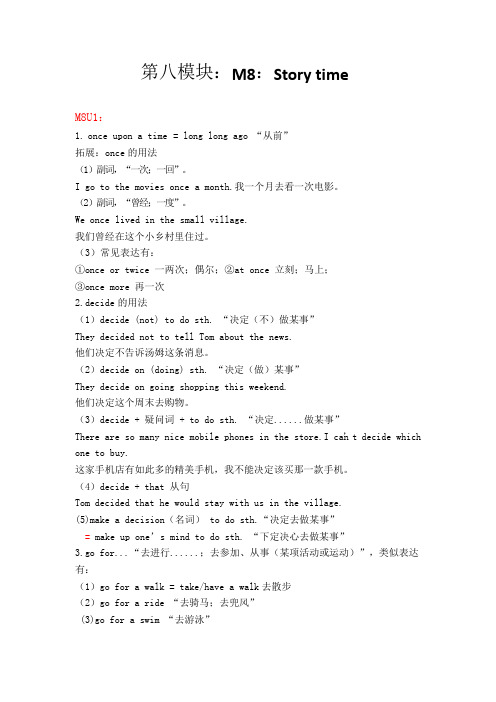
’t第八模块:M8:Story timeM8U1:1. once upon a time = long long ago “从前” 拓展:once 的用法(1)副词,“一次;一回”。
I go to the movies once a month.我一个月去看一次电影。
(2)副词,“曾经;一度”。
We once lived in the small village. 我们曾经在这个小乡村里住过。
(3)常见表达有:①once or twice 一两次;偶尔;②at once 立刻;马上; ③once more 再一次 2.decide 的用法(1)decide (not) to do sth. “决定(不)做某事” They decided not to tell Tom about the news. 他们决定不告诉汤姆这条消息。
(2)decide on (doing) sth. “决定(做)某事” They decide on going shopping this weekend. 他们决定这个周末去购物。
(3)decide + 疑问词 + to do sth. “决定......做某事”There are so many nice mobile phones in the store.I can decide which one to buy.这家手机店有如此多的精美手机,我不能决定该买那一款手机。
(4)decide + that 从句Tom decided that he would stay with us in the village. (5)make a decision (名词) to do sth.“决定去做某事”= make up one’s mind to do sth. “下定决心去做某事”3.go for... “去进行......;去参加、从事(某项活动或运动)”,类似表达有:(1)go for a walk = take/have a walk 去散步 (2)go for a ride “去骑马;去兜风”(3)go for a swim “去游泳”“(4)go for a trip “去旅行”(5)go for a picnic “去野餐”(6)go for a drive “开车出游”4.be/get lost = lose one’s way “迷路” lost and found office/box 失物招领处/箱5.look around “环顾四周,向四周看” 与 look 相关的短语:(1)look at 看 (2)look for 寻找 (3)look after 照顾 (4)look up 往上看;查找 (5)look down 往下看 (6)look out 往外看;当心 (7)look like 看起来像(8) look over 仔细检查 (9)look forward to 盼望;期待6.notice 的用法 (1)动词,“注意到”。
七年级下册英语八单元知识点
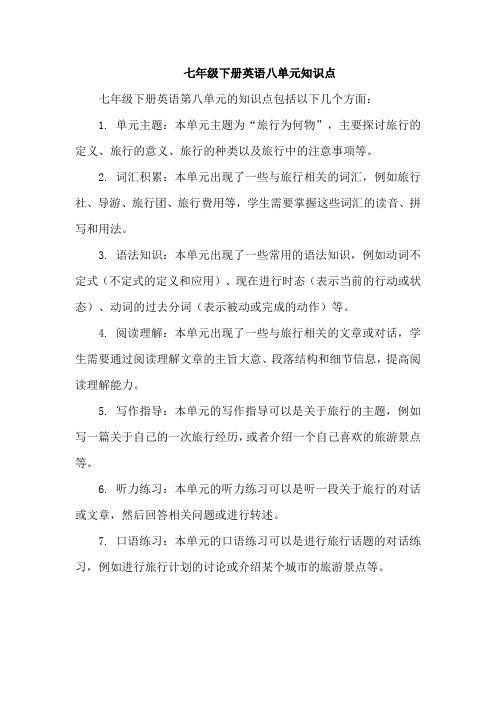
七年级下册英语八单元知识点
七年级下册英语第八单元的知识点包括以下几个方面:
1. 单元主题:本单元主题为“旅行为何物”,主要探讨旅行的定义、旅行的意义、旅行的种类以及旅行中的注意事项等。
2. 词汇积累:本单元出现了一些与旅行相关的词汇,例如旅行社、导游、旅行团、旅行费用等,学生需要掌握这些词汇的读音、拼写和用法。
3. 语法知识:本单元出现了一些常用的语法知识,例如动词不定式(不定式的定义和应用)、现在进行时态(表示当前的行动或状态)、动词的过去分词(表示被动或完成的动作)等。
4. 阅读理解:本单元出现了一些与旅行相关的文章或对话,学生需要通过阅读理解文章的主旨大意、段落结构和细节信息,提高阅读理解能力。
5. 写作指导:本单元的写作指导可以是关于旅行的主题,例如写一篇关于自己的一次旅行经历,或者介绍一个自己喜欢的旅游景点等。
6. 听力练习:本单元的听力练习可以是听一段关于旅行的对话或文章,然后回答相关问题或进行转述。
7. 口语练习:本单元的口语练习可以是进行旅行话题的对话练习,例如进行旅行计划的讨论或介绍某个城市的旅游景点等。
七年级下册外研版Module8知识点总结
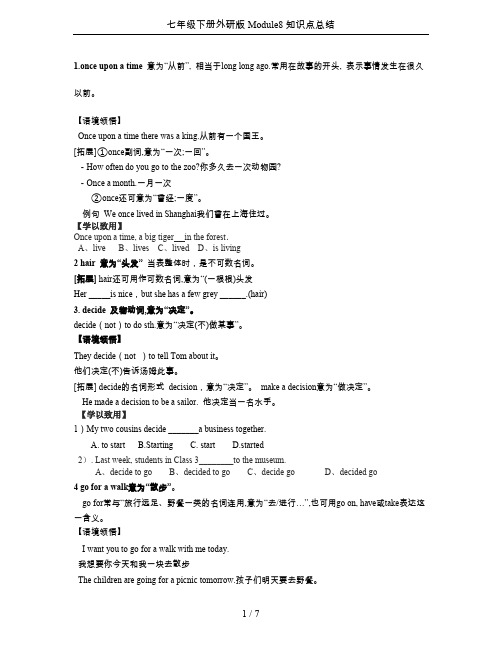
1.once upon a time意为“从前”, 相当于long long ago.常用在故事的开头, 表示事情发生在很久以前。
【语境领悟】Once upon a time there was a king.从前有一个国王。
[拓展]①once副词,意为“一次;一回”。
-How often do you go to the zoo?你多久去一次动物园?-Once a month.一月一次②once还可意为“曾经;一度”。
例句We once lived in Shanghai我们曾在上海住过。
【学以致用】Once upon a time, a big tiger in the forest.A、liveB、livesC、livedD、is living2 hair 意为“头发” 当表整体时,是不可数名词。
[拓展] hair还可用作可数名词,意为“(一根根)头发Her _____is nice,but she has a few grey ______.(hair)3. decide 及物动词,意为“决定”。
decide(not)to do sth.意为“决定(不)做某事”。
【语境领悟】They decide(not )to tell Tom about it。
他们决定(不)告诉汤姆此事。
[拓展] decide的名词形式decision,意为“决定”。
make a decision意为“做决定”。
He made a decision to be a sailor. 他决定当一名水手。
【学以致用】1)My two cousins decide _______a business together.A. to startB.StartingC. startD.started2). Last week, students in Class 3________to the museum.A、decide to goB、decided to goC、decide goD、decided go4 go for a walk意为“散步”。
Module8重要知识点外研版英语七年级下册
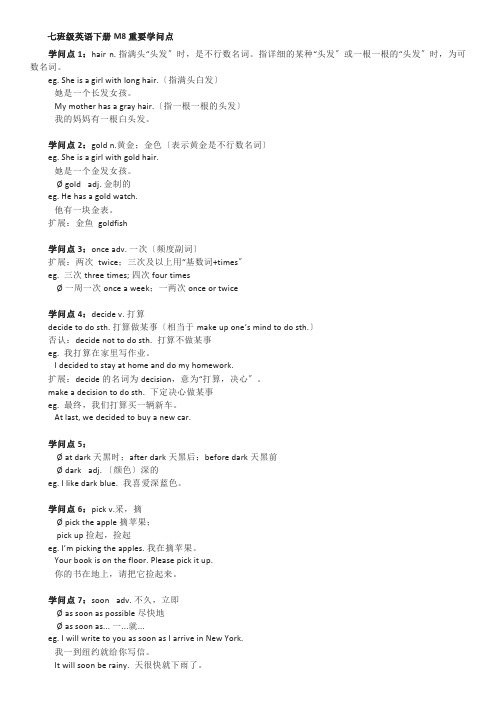
七班级英语下册M8重要学问点学问点1:hair n. 指满头“头发〞时,是不行数名词。
指详细的某种“头发〞或一根一根的“头发〞时,为可数名词。
eg. She is a girl with long hair.〔指满头白发〕她是一个长发女孩。
My mother has a gray hair.〔指一根一根的头发〕我的妈妈有一根白头发。
学问点2:gold n.黄金;金色〔表示黄金是不行数名词〕eg. She is a girl with gold hair.她是一个金发女孩。
Ø gold adj. 金制的eg. He has a gold watch.他有一块金表。
扩展:金鱼goldfish学问点3:once adv. 一次〔频度副词〕扩展:两次twice;三次及以上用“基数词+times〞eg. 三次 three times; 四次 four timesØ一周一次 once a week;一两次 once or twice学问点4:decide v. 打算decide to do sth. 打算做某事〔相当于make up one’s mind to do sth.〕否认:decide not to do sth. 打算不做某事eg. 我打算在家里写作业。
I decided to stay at home and do my homework.扩展:decide的名词为decision,意为“打算,决心〞。
make a decision to do sth. 下定决心做某事eg. 最终,我们打算买一辆新车。
At last, we decided to buy a new car.学问点5:Ø at dark 天黑时;after dark天黑后;before dark天黑前Ø dark adj. 〔颜色〕深的eg. I like dark blue. 我喜爱深蓝色。
七年级下英语8单元知识点
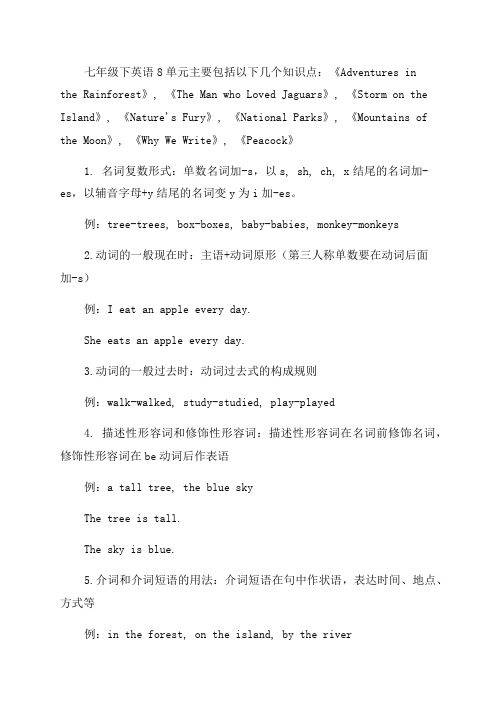
七年级下英语8单元主要包括以下几个知识点:《Adventures inthe Rainforest》, 《The Man who Loved Jaguars》, 《Storm on the Island》, 《Nature's Fury》, 《National Parks》, 《Mountains of the Moon》, 《Why We Write》, 《Peacock》1. 名词复数形式:单数名词加-s,以s, sh, ch, x结尾的名词加-es,以辅音字母+y结尾的名词变y为i加-es。
例:tree-trees, box-boxes, baby-babies, monkey-monkeys2.动词的一般现在时:主语+动词原形(第三人称单数要在动词后面加-s)例:I eat an apple every day.She eats an apple every day.3.动词的一般过去时:动词过去式的构成规则例:walk-walked, study-studied, play-played4. 描述性形容词和修饰性形容词:描述性形容词在名词前修饰名词,修饰性形容词在be动词后作表语例:a tall tree, the blue skyThe tree is tall.The sky is blue.5.介词和介词短语的用法:介词短语在句中作状语,表达时间、地点、方式等例:in the forest, on the island, by the river6. 物主代词的用法:形容词性物主代词(my, your, his, her, its, our, their)和名词性物主代词(mine, yours, his, hers, ours, theirs)的区别及用法例:This is my book.The book is mine.7. 一般疑问句的构成及回答方式:疑问词+一般疑问句(助动词或be动词提到句首,其他动词要在句首加do/does/did)例:Does he like bananas?Yes, he does./No, he doesn't.8. 表示能力的情态动词can和不能力的情态动词can't的用法:can表示能力、允许、请求等,can't表示不能力、不允许、禁止等例:I can swim.I can't swim.9. 情态动词must的用法:表示推测或肯定的意思,一般用在句子前面例:It must be true.You must be joking.10.句子的陈述句、疑问句、祈使句和感叹句的构成及变换:陈述句是陈述事实,疑问句是对事实提问,祈使句是发出命令或请求,感叹句是表达赞叹、惊讶或怀疑等感情的句子例:She is a doctor.(陈述句)Is she a doctor?(疑问句)Be a doctor.(祈使句)What a doctor she is!(感叹句)11.短语动词的用法:短语动词是由动词+介词或副词组成的固定搭配,含义不一定和动词的原意相同。
外研社七年级英语下册 模块8 Story time知识点归纳
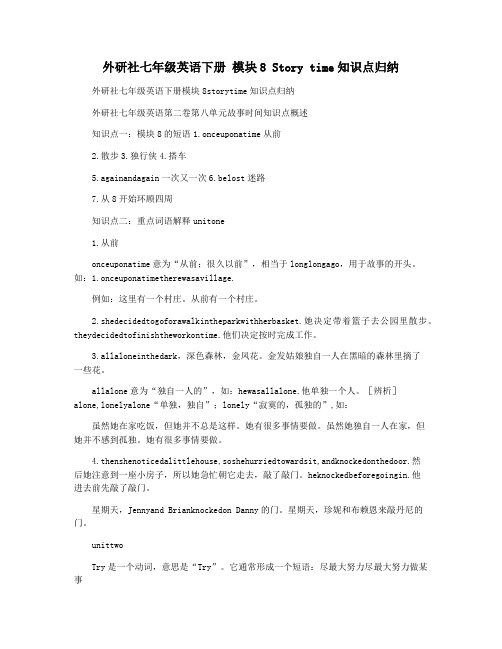
外研社七年级英语下册模块8 Story time知识点归纳外研社七年级英语下册模块8storytime知识点归纳外研社七年级英语第二卷第八单元故事时间知识点概述知识点一:模块8的短语1.onceuponatime从前2.散步3.独行侠4.搭车5.againandagain一次又一次6.belost迷路7.从8开始环顾四周知识点二:重点词语解释unitone1.从前onceuponatime意为“从前;很久以前”,相当于longlongago,用于故事的开头。
如:1.onceuponatimetherewasavillage.例如:这里有一个村庄。
从前有一个村庄。
2.shedecidedtogoforawalkintheparkwithherbasket.她决定带着篮子去公园里散步。
theydecidedtofinishtheworkontime.他们决定按时完成工作。
3.allaloneinthedark,深色森林,金凤花。
金发姑娘独自一人在黑暗的森林里摘了一些花。
allalone意为“独自一人的”,如:hewasallalone.他单独一个人。
[辨析]alone,lonelyalone“单独,独自”;lonely“寂寞的,孤独的”,如:虽然她在家吃饭,但她并不总是这样。
她有很多事情要做。
虽然她独自一人在家,但她并不感到孤独。
她有很多事情要做。
4.thenshenoticedalittlehouse,soshehurriedtowardsit,andknockedonthedoor.然后她注意到一座小房子,所以她急忙朝它走去,敲了敲门。
heknockedbeforegoingin.他进去前先敲了敲门。
星期天,Jennyand Brianknockedon Danny的门。
星期天,珍妮和布赖恩来敲丹尼的门。
unittwoTry是一个动词,意思是“Try”。
它通常形成一个短语:尽最大努力尽最大努力做某事2.verysoonshewasasleepinit.很快她就在小床上睡着了。
七年级下册英语第八单元知识点总结
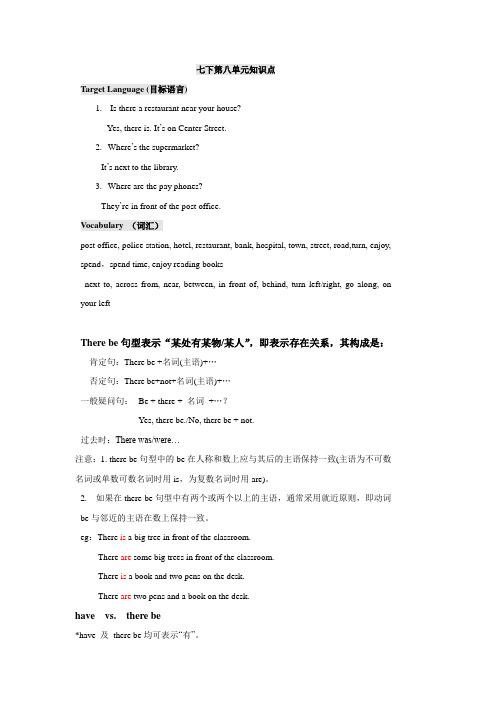
七下第八单元知识点Target Language (目标语言)1.--Is there a restaurant near your house?--Yes, there is. It’s on Center Street.2.--Where’s the supermarket?--It’s next to the library.3.--Where are the pay phones?--They’re in front of the post office.Vocabulary (词汇)post office, police station, hotel, restaurant, bank, hospital, town, street, road,turn, enjoy, spend,spend time, enjoy reading booksnext to, across from, near, between, in front of, behind, turn left/right, go along, on your leftThere be句型表示“某处有某物/某人”,即表示存在关系,其构成是:肯定句:There be +名词(主语)+…否定句:There be+not+名词(主语)+…一般疑问句:--Be + there + 名词+…?--Yes, there be./No, there be + not.过去时:There was/were…注意:1. there be句型中的be在人称和数上应与其后的主语保持一致(主语为不可数名词或单数可数名词时用is,为复数名词时用are)。
2. 如果在there be句型中有两个或两个以上的主语,通常采用就近原则,即动词be与邻近的主语在数上保持一致。
eg:There is a big tree in front of the classroom.There are some big trees in front of the classroom.There is a book and two pens on the desk.There are two pens and a book on the desk.have vs. there be*have 及there be均可表示“有”。
外研版七年级下册Module 8重点内容总结

外研版七年级下册module 8重点内容总结【语法】行为动词的一般过去时(1)当我们谈论过去的动作或状态时,常常使用一般过去时,句中的谓语动词要用过去式。
如:Jack often goes to school by bike, but today he walked to school.杰克经常骑自行车去学校,但是今天他是步行去学校的。
(2)行为动词的一般过去式变化规则如下表:变化规则原形过去式一般动词结尾加-ed WalkListenLookfinish Walked Listened Looked finished以不发音的字母e结尾的动词后加-d LiveNoticedecide Lived Noticed decided以“辅音字母+y”结尾的动词,y变为i,再加-ed Hurrymarry Hurried married以“元音字母+一个辅音字母”结尾的重读闭音节动词,先双写辅音字母,再加-ed StopstepStoppedstepped(3)一般过去时的肯定、否定、疑问和回答方式的变化如下:肯定否定一般疑问句回答I started school at five. I didn’t (didn’t)startschool at five.Did I start schoolat five?Yes, I did.No, I didn’t.You took a walk this morning. You didn’t (didn’t) takea walk this morning.Did you take awalk thismorning?Yes, you did.No, you didn’t.He\She moved to London. He\She didn’t (didn’t)move to London.Did he\she moveto London?Yes, he\she did.No, he\she didn’t.It rained heavily. It didn’t (didn’t)rainheavily. Did it rainheavily?Yes, it did.No, it didn’t.We played football yesterday. We didn’t (didn’t)play football yesterday.Did we playfootball yesterday?Yes, we did .No, we didn’t.They played basketball last week. They didn’t (didn’t)play basketball lastweek.Did they playbasketball lastweek?Yes, they did.No, they didn’t.【重点词汇】try v. 尝试◆Finally, she tried the small chair. 最后,她试了试那把小椅子。
外研版英语七年级下册Module8课文+知识点

外研版英语七年级下册Module8课文音频+视频+知识点◆◆◆01Module 8 单词hair [wə:k] n. 头发gold [ɡəuld] n. 金色; 黄金; 金牌forest ['fɒrist] n. 森林once [wʌns] adv. 一次; 一回upon [ə'pɔn, əpən] prep. 在……上; 到……上once upon a time从前decide [di'said] v. 决定go for a walk散步basket ['bɑ:skit] n. 篮子notice ['nəʊtis] v. 注意到all alone独自一人的dark [dɑ:k] adj. 黑暗的pick [pik] v. 采; 摘pick up拿起; 举起soon[su:n] adv. 立刻; 不久lost [lɒst] adj. 迷路的around [ə'raʊnd] prep. 环绕着little ['litl] adj. 小的towards [tə'wɔ:dz] prep. 往; 向; 朝……方向knock[nɔk] v. 敲door [dɔ:(r)] n. 门answer['ɑ:nsə(r)] v. 应门; 回答push[pʊʃ] v. 推enter ['entə(r)] v. 进入bowl[bəʊl] n. 碗hungry ['hʌŋgri] adj. 感到饿的; 饥饿的right [rait] adj. 合适的; 恰当的finish ['finiʃ] v. 吃完; 喝完; 用尽either ['aiðə(r)] adv. 也(不)piece[pi:s] n. 部件; 碎片; 一件/个/张in pieces破碎asleep[ə'sli:p] adj. 睡着的return [ri'tɜ:n] v. 返回; 归还cry[krai] v. 哭; 喊叫at first起初; 首先point[pɔint] v. 指向; 指point at指着……shout[ʃaʊt] v. 高声说; 大声喊jump[dʒʌmp] v. 跳without[wi'ðaʊt] prep. 无; 没有part [pɑ:t] n. 部分; 地区; 地方02Module 8课文动画外研版七年级下册Module 8 Unit 1 课文动画外研版七年级下册Module 8 Unit 2 课文动画03Module 8 知识梳理【重点词组】1. once upon a time 从前2. in the forest 在森林里3. look into 向…里面看去4. knock on the door 敲门5. a girl with hair of gold 一个留着金色头发的女孩6. push the door 推开门7. go for a walk 去散步8. pick up 捡起,拾起9. pick some flowers 摘一些花10. look around 环视,四下张望11. in pieces 破碎12. at first 首先,最初13. sit down 坐下14. point at 指着15. walk into the bedroom 走进卧室16. jump out of bed 跳下床17. be asleep 睡着18. go home 回家19. change into 变成…20. again and again 一遍又一遍21. around the world 全世界22. begin with 以…开始【重点句型】1. All alone in the dark forest, Goldilocks picked some flowers.金凤花姑娘独自走进了阴暗的森林里,摘了一些花。
外研版七下Module8 核心知识总结
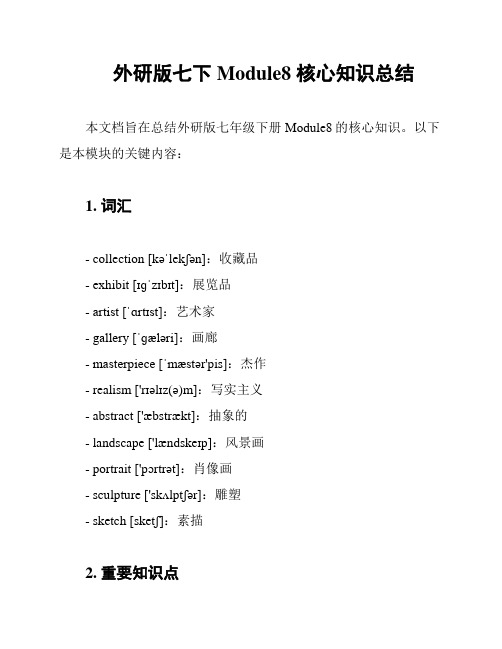
外研版七下Module8 核心知识总结
本文档旨在总结外研版七年级下册Module8的核心知识。
以下是本模块的关键内容:
1. 词汇
- collection [kəˈlekʃən]:收藏品
- exhibit [ɪɡˈzɪbɪt]:展览品
- artist [ˈɑrtɪst]:艺术家
- gallery [ˈɡæləri]:画廊
- masterpiece [ˈmæstər'pis]:杰作
- realism ['rɪəlɪz(ə)m]:写实主义
- abstract ['æbstrækt]:抽象的
- landscape ['lændskeɪp]:风景画
- portrait ['pɔrtrət]:肖像画
- sculpture ['skʌlptʃər]:雕塑
- sketch [sketʃ]:素描
2. 重要知识点
- 本模块主要介绍了艺术及艺术作品的相关知识。
通过研究不同类型的艺术作品,学生可以了解艺术的表现方式和意义。
- 研究展品的分类和不同类型的艺术作品,培养学生的艺术鉴赏能力。
- 研究艺术家的作品和风格,了解不同艺术家的成就和对艺术的贡献。
3. 知识拓展
- 学生可以通过参观艺术展览、阅读相关书籍和资料来进一步了解艺术。
- 学生可以自己尝试绘画、雕塑等艺术创作,提升自己的艺术水平。
以上是外研版七下Module8核心知识的总结,希望对学生们的研究有所帮助。
外研版七下Module8 知识点总结
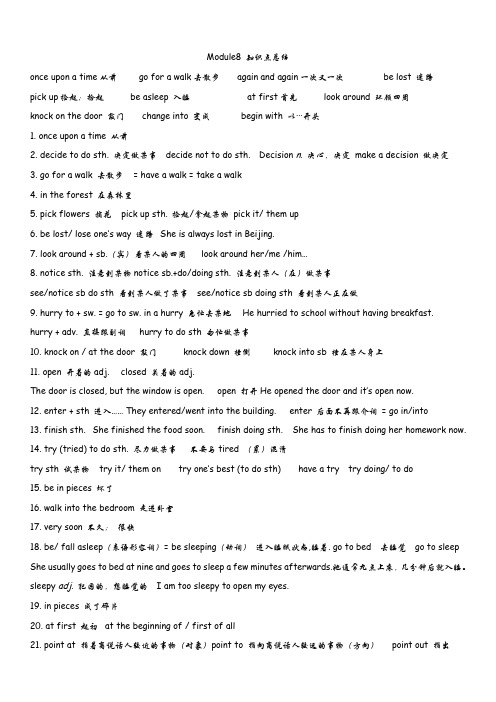
Module8 知识点总结once upon a time从前go for a walk去散步again and again一次又一次be lost 迷路pick up捡起;拾起be asleep 入睡at first首先look around 环顾四周knock on the door 敲门change into 变成begin with 以···开头1. once upon a time 从前2. decide to do sth. 决定做某事decide not to do sth. Decision n. 决心,决定make a decision 做决定3. go for a walk 去散步 = have a walk = take a walk4. in the forest 在森林里5. pick flowers 摘花pick up sth. 捡起/拿起某物pick it/ them up6. be lost/ lose one’s way 迷路She is always lost in Beijing.7. look around + sb.(宾)看某人的四周look around her/me /him…8. notice sth. 注意到某物notice sb.+do/doing sth. 注意到某人(在)做某事see/notice sb do sth 看到某人做了某事see/notice sb doing sth 看到某人正在做9. hurry to + sw. = go to sw. in a hurry 急忙去某地 He hurried to school without having breakfast.hurry + adv. 直接跟副词hurry to do sth 匆忙做某事10. knock on / at the door 敲门knock down 撞倒knock into sb 撞在某人身上11. open 开着的adj. closed 关着的adj.The door is closed, but the window is open. open 打开He ope ned the door and it’s open now.12. enter + sth 进入…… They entered/went into the building.enter 后面不再跟介词= go in/into13. finish sth. She finished the food soon. finish doing sth. She has to finish doing her homework now.14. try (tried) to do sth. 尽力做某事不要与tired (累)混淆try sth 试某物try it/ them on try one’s best (to do sth) have a try try doing/ to do15. be in pieces 坏了16. walk into the bedroom 走进卧室17. very soon 不久;很快18. be/ fall asleep(表语形容词)= be sleeping(动词)进入睡眠状态,睡着. go to bed 去睡觉go to sleep She usually goes to bed at nine and goes to sleep a few minutes afterwards.她通常九点上床,几分钟后就入睡。
初一下册八单元知识点总结
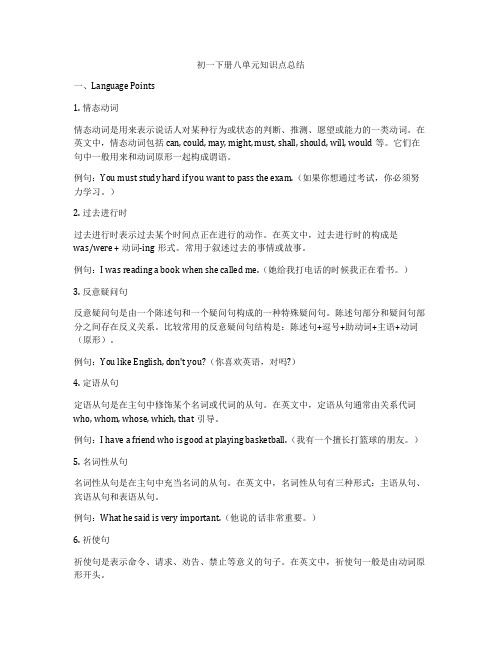
初一下册八单元知识点总结一、Language Points1. 情态动词情态动词是用来表示说话人对某种行为或状态的判断、推测、愿望或能力的一类动词。
在英文中,情态动词包括can, could, may, might, must, shall, should, will, would等。
它们在句中一般用来和动词原形一起构成谓语。
例句:You must study hard if you want to pass the exam.(如果你想通过考试,你必须努力学习。
)2. 过去进行时过去进行时表示过去某个时间点正在进行的动作。
在英文中,过去进行时的构成是was/were + 动词-ing形式。
常用于叙述过去的事情或故事。
例句:I was reading a book when she called me.(她给我打电话的时候我正在看书。
)3. 反意疑问句反意疑问句是由一个陈述句和一个疑问句构成的一种特殊疑问句。
陈述句部分和疑问句部分之间存在反义关系。
比较常用的反意疑问句结构是:陈述句+逗号+助动词+主语+动词(原形)。
例句:You like English, don't you?(你喜欢英语,对吗?)4. 定语从句定语从句是在主句中修饰某个名词或代词的从句。
在英文中,定语从句通常由关系代词who, whom, whose, which, that引导。
例句:I have a friend who is good at playing basketball.(我有一个擅长打篮球的朋友。
)5. 名词性从句名词性从句是在主句中充当名词的从句。
在英文中,名词性从句有三种形式:主语从句、宾语从句和表语从句。
例句:What he said is very important.(他说的话非常重要。
)6. 祈使句祈使句是表示命令、请求、劝告、禁止等意义的句子。
在英文中,祈使句一般是由动词原形开头。
例句:Open the window, please.(请打开窗户。
七年级下册八模块知识点
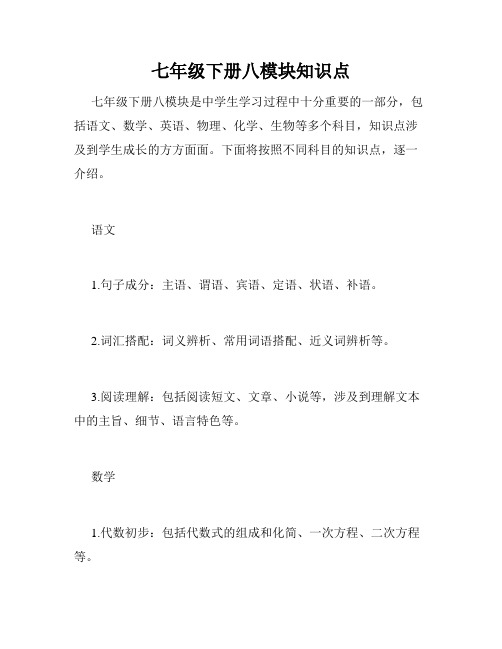
七年级下册八模块知识点七年级下册八模块是中学生学习过程中十分重要的一部分,包括语文、数学、英语、物理、化学、生物等多个科目,知识点涉及到学生成长的方方面面。
下面将按照不同科目的知识点,逐一介绍。
语文1.句子成分:主语、谓语、宾语、定语、状语、补语。
2.词汇搭配:词义辨析、常用词语搭配、近义词辨析等。
3.阅读理解:包括阅读短文、文章、小说等,涉及到理解文本中的主旨、细节、语言特色等。
数学1.代数初步:包括代数式的组成和化简、一次方程、二次方程等。
2.几何初步:包括图形的性质、圆的相关知识、空间几何等。
3.函数初步:包括函数的概念、图像、性质等。
英语1.基本语法:包括基本句型、时态、语态、比较级和最高级等。
2.词汇语法:包括动词、名词、代词、形容词、副词、介词等。
3.阅读理解:包括短文、文章、小说等。
物理1.物理基本概念:包括运动学、力学、热学、光学等。
2.物理实验:包括简单实验和综合实验两个部分。
3.物理应用:包括物理规律在日常生活中的应用和相关工程应用等。
化学1.化学基本概念:包括化学反应、物质的组成、元素周期表等。
2.化学实验:包括简单实验和综合实验两个部分。
3.化学应用:包括化学规律在日常生活中的应用和相关工程应用等。
生物1.生命现象基础:包括细胞、组织、器官和生命活动等。
2.生物分类:包括动物和植物的分类、生态系统的构成等。
3.生物实验:包括自然环境模拟实验、组织器官解剖实验等。
以上是七年级下册八模块的主要知识点,学生们需要在平时的学习中认真对待每个知识点,掌握核心概念,才能够在考试中取得好成绩。
同时,在学习的过程中,要注重理论的联系实际,注重实践的操作过程,这样才能更好地应用已学知识。
七年级英语下 Module 8
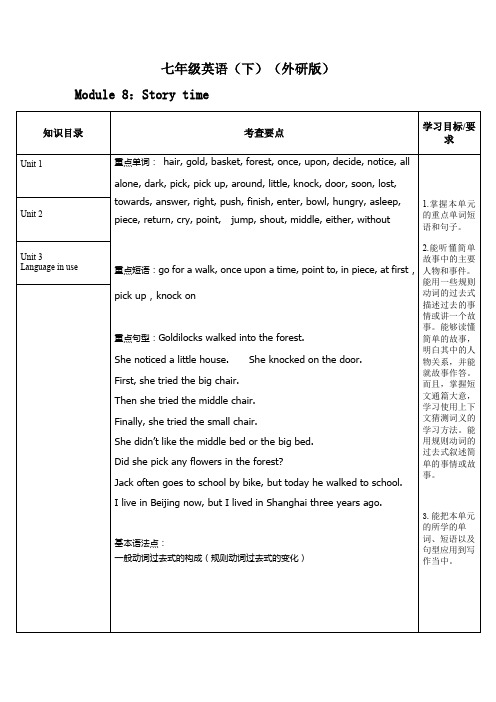
七年级英语(下)(外研版)Module 8:Story time·【易错题举例】【例1】:1.Father some bread for breakfast this morning.A. haveB. hasC. havingD. had【答案】D【解析】此题重点考查一般过去时的基本构成。
This morning表示过去时间。
Have的过去式要用had。
Had没有人称和数的变化。
【例2】:2.Bob ________to Harbin for a meeting yesterday.A. will goB. goesC. has goneD. went【答案】D【解析】此题重点考查一般过去时的基本构成和用法。
【例3】:3.-Wow! What a nice bike! Is it yours?- No, it isn't.I____it from a friend of mine.A. borrowB.am borrowingC.will borrowD.borrowed【答案】D【解析】试题分析:句意:--哇,多么好的书呀!它是你的吗?--不是,我是从我的朋友那里借来的。
根据What a nice bike! Is it yours?可知,书已经借来了。
所以应该用一般过去时。
故选D。
·【相似练习】【练习1】:5.Yesterday I _______my leg and that made me_______sad.A.broke ; feltB. break ; feelC.broke ; feelD.break ; felt【答案】C【解析】试题分析:句意:昨天我摔断了我的腿,那使得我感到悲伤。
根据时间可知用过去时态,make sb do sth,使某人做某事,结合句意,故选C。
【练习2】:6. --- Whenyou free last week?--- Well, Ihave a free day because there was too much work.A. did, didn’tB. were; didn’tC. were, wa sn’tD. did, wasn’t【答案】B【解析】试题分析:句意:-上周你什么时候有空?-我没有一天有空,因为有很多工作。
七年级下册外研版英语Modle8知识点
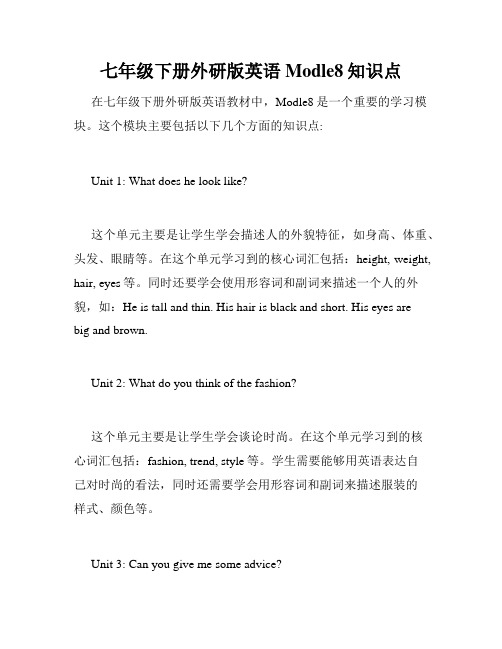
七年级下册外研版英语Modle8知识点在七年级下册外研版英语教材中,Modle8是一个重要的学习模块。
这个模块主要包括以下几个方面的知识点:Unit 1: What does he look like?这个单元主要是让学生学会描述人的外貌特征,如身高、体重、头发、眼睛等。
在这个单元学习到的核心词汇包括:height, weight, hair, eyes等。
同时还要学会使用形容词和副词来描述一个人的外貌,如:He is tall and thin. His hair is black and short. His eyes arebig and brown.Unit 2: What do you think of the fashion?这个单元主要是让学生学会谈论时尚。
在这个单元学习到的核心词汇包括:fashion, trend, style等。
学生需要能够用英语表达自己对时尚的看法,同时还需要学会用形容词和副词来描述服装的样式、颜色等。
Unit 3: Can you give me some advice?这个单元主要是让学生学会向别人提出建议。
在这个单元学习到的核心词汇包括:advice, suggestion, recommend等。
学生需要能够用英语向别人提出建议,并学会用万能的句型"I think you should..."来表达自己的观点。
Unit 4: Do you want to go with us?这个单元主要是让学生学会向别人邀请并接受邀请。
在这个单元学习到的核心词汇包括:invitation, accept, refuse等。
学生需要能够用英语向别人发出邀请,并学会用句型"Would you like to..."来邀请别人。
同时,学生还需要学会用英语表达接受或拒绝别人的邀请。
Unit 5: What do you think of game shows?这个单元主要是让学生学会谈论电视节目。
- 1、下载文档前请自行甄别文档内容的完整性,平台不提供额外的编辑、内容补充、找答案等附加服务。
- 2、"仅部分预览"的文档,不可在线预览部分如存在完整性等问题,可反馈申请退款(可完整预览的文档不适用该条件!)。
- 3、如文档侵犯您的权益,请联系客服反馈,我们会尽快为您处理(人工客服工作时间:9:00-18:30)。
七年级下Module8 知识要点一、重点单词⒈found建立(动词)→founder创建者(名词)⒉find找到(动词)→found(find的过去式)⒊science科学→scientist 科学家⒋friend朋友(名词)→friendly友好的(形容词)→(反)unfriendly⒌naughty→(反)well-behaved⒍store商店→(同意)shop ⒎movie→(同意)film⒏post邮件;邮政(名词) 张贴;宣布;设岗;邮寄(动词)→poster招贴画;海报(名词)⒐fish"指鱼的条数"单复同形fish→复数fish(two fish两条鱼)”指鱼的种类”fish→复数fishes(two fishes两种鱼)”指鱼肉”为不可数名词Help yourself to some fish随便吃些鱼;///动词译为”钓鱼/捕鱼”go fishing⒑somewhere某处/某个地方(由形容词修饰时形容词放在其后somewhere quilt)→anywhere用于否/问句→nowhere任何地方都不/什么地方也没有=not…anywhere ⒒unfriendly不友好的⒓second第二;秒⒔Mr./Mrs./.Ms./Miss区别见名校P51.⒕⒖⒗⒘⒙⒚⒛二、重点短语(一)单词表中短语补充⒈in the past在过去⒉be born in/on…出生于⒊be strict with sb.对某人严格⒋be strict in sth对某事严格⒌be friendly to sb对…友好⒍more/most friendly更/最友好的⒎see a film看电影=see a movie⒏go to the cinema去看电影=go to the movies⒐film star电影名星=movie star⒑play baseball打棒球⒒on the wall在墙上(表面上)⒓in the wall在墙上(镶嵌在墙里)⒔two fish两条鱼(单复数一样)⒕two fishes(两种鱼)⒖much fish许多鱼肉⒗go back to…回到…⒘somewhere quiet安静的地方(somewhere由形容词修饰时形容词放在其后⒙an unfriendly boy一个不友好的男孩⒚my second son我的第二个儿子(序数词前有物主代词/所有格时前不要the)⒛(二)课文中的短语⒈be born in Bejing/1991出生于北京/1991年⒉be born on May 1st ,1991出生于1991年5月1日⒊the name of……的名字⒋what be sb like ?某人的性格/个性如何(What are you like?I am naughty)⒌What do/does/did sb look like?某人长相如何?(What does he look like?He is very tall.)⒍by Tom由/被汤姆⒎lots of things to do许多做的事情(“to+动原”称为动词不定式;;不定式做定语放在修饰词之后,译为“…的”my first time次to come here//a place to play//I have much homework to do⒏old family house故居⒐come to 来到⒑last time上次/最后一次⒒movie theater剧院/电影院=cinema⒓two presidents of the USA美国的两位总统⒔one day 有一天;总有一天(一般用于将来时I will come here one day⒕our lives我们的生活(life→复数lives)⒖in a small village在一个小村庄里⒗my best friend我的最好的朋友(形最前有物主代词,所有格the要省⒘five year s old五岁⒙five-year-old 五岁的(有s没有连词符,有连词符没有S)⒚⒛三、重点句子⒈what be sb like ?某人的性格/个性如何(What are you like?I am naughty)⒉What do/does/did sb look like?某人长相如何?(What does he look like?He is very tall.)⒊There was a room with带有/具有a TV⒋There were posters of的my favorite movie stars⒌It was great to play there.(It`s adj.(形容词)for sb to do sth干…对…是怎么样It`s important重要的for us to learn English.⒍Was anyone famous born (有here/there/home省了介词))here?有出名的人出生在这儿吗?⒎He does what the techer tells him他做老师告诉他的事情⒏There be的过去There was/were…(表过去某时/某地的某人/物)There was(单数)a book on the desk just now.//There were(复数) two boys in the room just now.⒐⒑⒒⒓⒔⒕⒖⒗⒘⒙⒚⒛四、重点语法:Be 动词的过去时P150(一)用法:表过去的身份,位置,情况或状态I was a student last year/He was in the room just now./ They were careful in the past.(二)结构①肯定句:主语+was/were+其它②否定句:was/were后加not(wasnot=wasn`t//were not=weren`t)③一般疑问句:was/were提前(回答Y es,…was/were.//No…wasn`t/weren`t)④am/is→was///are→were(三)时间标志①three days ago三天前②last night/week/month/year/Sunday/term上一(个)/刚过去的晚上/周/月/年/星期日/学期③in the past在过去④yesterday昨天//yesterday morning/…昨天早上//the day before yesterday前天⑤just now刚才⑥once upon a time=long long ago从前⑦in 2003/…在2003年/…⑧⑨⑩五、作业(一)用所给词的正确形式填空,不填空的打╳.⒈Bill Gates is the_____(found) of Microsoft.⒉I_____(find)it in my bag just now(刚才).⒊These men are_________(science)⒋My_____(friend) are_______(friend)⒌He is ___(a) un friendly man.⒍There were many ________(post) of的my favorite movie stars⒎It takes him two hours____ ___(watch) TV every day⒏There are many_____(fish) in the pond.⒐He often eats _____(fish)⒑Let`s go_______(fish钓鱼))⒒The Y ellow River is the_______(two) longest river in China.⒓He is one of ____ _____ _______(friendly)boys of us all我们全部⒔I like playing____(the)baseball.⒕He is an________(friendly)boy.⒖He is my_____(the)second son.⒗I have lots of homework__ ___(do).Beijing is a good place ____ ___(visit).⒘He is asking about our_____(life)⒙She is his_____(the) best friend.⒚It`s important重要的for us __ _____(learn) English.⒛There ____(be) a book,two pens on the desk just now.21.There_____(be)many people in the village l ast year22.___anyone famous born here?.23.Tom _____(be)a teacher two year ago24.Tom and Jim_____(be) at home yesterday afternoon.25His mother______(be)beautiful in the past.26Did you go ______(somewhere) last week?.(二)介词填空(不填空的打╳)27.He was born _____1991.I was born _____July 22nd,1999.28.He is strict _____us and ____his work.29.I am friendly____them.30What was the name ____your first school?31The book was written____LuXun32I am looking forward to coming ___ China. 33He is a professor ____the USA34It is a big garden _____lots of trees.35When did you go back____ your hometown?36.There are some pictures _____the wall.37It`s easy_____me to learn English.38Was he born_____here?.(三)变同义句39.He isn`t naughty=He is__________.40They are shops=They are_____.41He went nowhere=He didn`t go_______42He often goe to the cinema=He often goes to the_______.43The boy is five years old=He is a_____________boy.44It is a garden.The garden has lots of trees=It is a garden_____lots of trees.(四)选择填空.45.He wants to go____(somewhere quiet/quiet somewhere)46.There are some windows____(on/in) the wall.47._______(What does Tom look like?/What is Tom like?)He is very fat and shor t.(五)句型转换48There was some fish in the bowl否定句→There______ ______ ______fish in the bowl= There______ ______ fish in the bowl49.They were at home变否定句There________at home.50There were some books in the bag.变一般问句→_____there____books in the bags?Y es,_____ _____/No,______ _______51.His mother was a teacher two years ago变一般问句______his mother a teacher two years ago?yes,___ ____/No,____ _____.52Tom was very friendly对划线部分提问→____ ____Tom______?53He is thin and tall对划线部分提问→____does Tom_____ _____?( 六)翻译54在这个池塘里有许多种鱼There _____many____ ___ the pond.55你出生在什么时候什么地点?_____and_____ ____you ______?56他的兄弟是什么性格?What______his brother_______?他长相如何?_____ does he _____ _____?57我有许多工作要做I have __ of work___ ____.57.我最后一次唱歌是在2003年The____ _____I sang _____ in 2003.58.总有一天我要回到我的家乡____ ___ I ___ go ____ ___my hometown.59.对于他而言努力工作是非常重要的_____ _____ _____ him__work hard.60他每天花一个小时做作业He _____ __ hour (in) ____homework//___ homework every day.。
